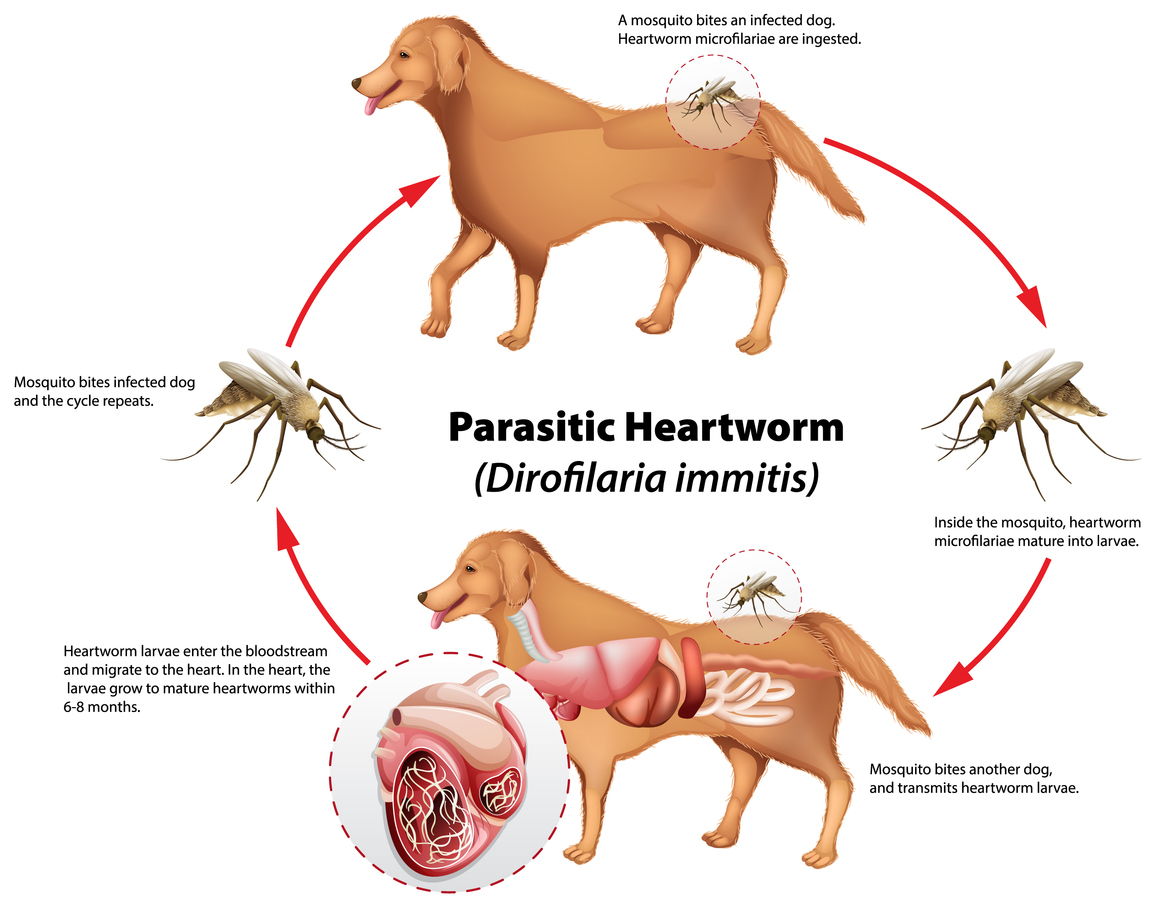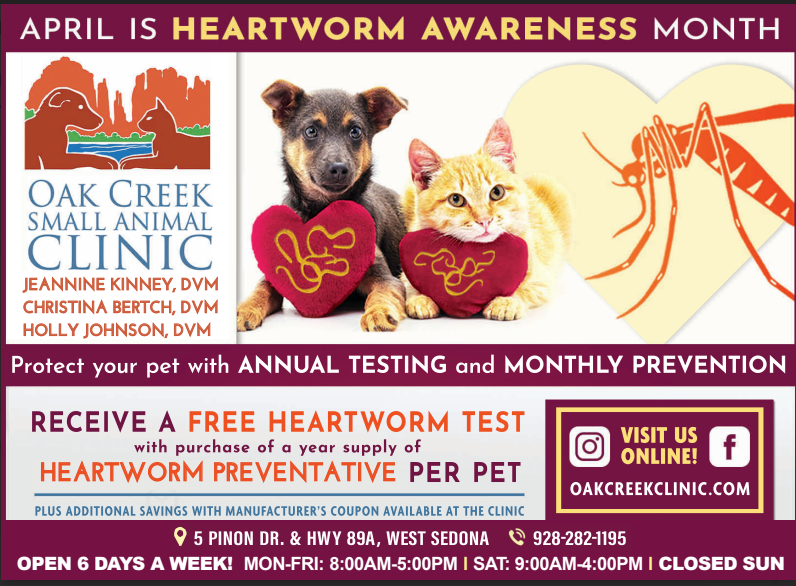Living in Sedona means being surrounded by breathtaking red rock landscapes, endless hiking trails, and clear desert skies. It is the perfect setting for outdoor adventures with your pets—but it also brings hidden health risks, including the threat of heartworm disease. Even in drier climates like ours, mosquitoes are present and capable of transmitting heartworm to your pet. At Oak Creek Small Animal Clinic, we are here to help you understand the importance of heartworm prevention. Read on to learn how you can take simple steps to keep your pet safe and healthy all year long and receive a free heartworm test for your beloved pet.
What is Heartworm Disease?

Heartworm disease is a serious and potentially deadly condition caused by parasitic worms that live in the heart, lungs, and blood vessels of infected pets. It is spread through the bite of a mosquito, which makes heartworm prevention especially important in areas where mosquito activity can still thrive—even in the desert.
When a mosquito carrying microscopic heartworm larvae bites your pet, those larvae enter the bloodstream and begin to grow. Within months, they can mature into adult worms, sometimes reaching up to a foot in length. These worms disrupt blood flow, damage organs, and can eventually lead to heart failure or death if not treated.
While dogs are the most common hosts for heartworms, cats and ferrets can be affected too. Cats typically carry fewer worms, but even a single worm can cause serious respiratory and neurological issues.
Because symptoms often develop slowly, many pet owners are unaware of the danger until the disease is advanced. That is why consistent heartworm prevention and annual testing are vital.
Recognizing the Signs of Heartworm
Often called a “silent threat,” heartworm disease may not show signs until the damage is already severe. Be aware of the following symptoms:
In Dogs:
- Persistent cough
- Fatigue after light exercise
- Decreased appetite
- Weight loss
- Swollen abdomen or signs of heart failure in later stages
In Cats:
- Coughing or wheezing
- Vomiting
- Loss of appetite
- Difficulty walking, fainting, or sudden collapse
In Ferrets:
- Weakness or hind leg paralysis
- Swollen belly
- Weight loss
- Unusual fatigue
If you observe any of these signs, contact Oak Creek Small Animal Clinic right away for diagnostic testing and care.
How Heartworm is Diagnosed and Treated
At our clinic, we use several methods to detect heartworm disease early:
- Blood tests to check for heartworm proteins or immature larvae
- Chest X-rays to look for heart or lung changes
- Ultrasound to visualize adult worms in the heart
For Dogs:
Treatment involves a multi-step process:
- Stabilizing the pet, especially if they are already showing severe symptoms
- Medication to kill the adult worms
- Strict rest during recovery
- Follow-up testing to ensure the infection is cleared
For Cats and Ferrets:
There is currently no approved drug to eliminate heartworms in cats or ferrets. Instead, we focus on:
- Reducing inflammation and supporting breathing
- Providing oxygen therapy or other supportive treatments
- Ongoing monitoring with imaging and lab work
Because treatment is often risky, heartworm prevention is always the preferred option.
The Power of Prevention
Heartworm disease is preventable, and the steps are simple and effective. At Oak Creek Small Animal Clinic, we recommend:
- Monthly Heartworm Preventives
These come as chewable tablets, topicals, or injections and are prescribed based on your pet’s age, weight, and health. These medications eliminate heartworm larvae before they can develop into adult worms. - Annual Heartworm Testing
Even pets on consistent prevention need yearly tests to confirm the medication is working. - Mosquito Control at Home
While Sedona has fewer mosquitoes than tropical regions, they still pose a threat. Use screens on windows and doors, avoid standing water, and keep pets indoors during dawn and dusk when mosquitoes are most active.
By practicing regular heartworm prevention, you can give your pet the best chance at a long, healthy life.
Why a Prescription is Necessary
The American Veterinary Medical Association (AVMA) requires heartworm preventatives to be prescribed by a licensed veterinarian. Giving a preventive to a pet already infected with heartworms could cause severe reactions, so annual testing is required before prescribing or refilling medication. Missing even one dose can allow heartworm larvae to mature, making prevention ineffective.
Consistency and regular veterinary care are the foundation of successful heartworm prevention.
Oak Creek’s April Heartworm Special!

Oak Creek Small Animal Clinic: Your Partner in Year-Round Heartworm Prevention

At Oak Creek Small Animal Clinic, we are more than just your pet’s healthcare provider—we are your partners in lifelong wellness. Whether your dog loves exploring Sedona’s trails or your cat enjoys relaxing in the sun by the window, every pet is vulnerable to heartworm disease. Fortunately, with our guidance and a customized heartworm prevention plan, you can protect them with confidence.
Schedule your pet’s heartworm test today, refill their preventive medication, or talk to us about getting started. Together, we can keep your pet safe from heartworm disease—and ready for every adventure Sedona has to offer.
Marc Kinney
Oak Creek Small Animal Clinic, PLLC
5 Pinon Drive
Sedona, Arizona 86336
Office: 928-282-1195
Mobile: 928-301-5430
Fax: 928-282-3065




